The firm selling raincoats with added Swedish melancholy
- Published
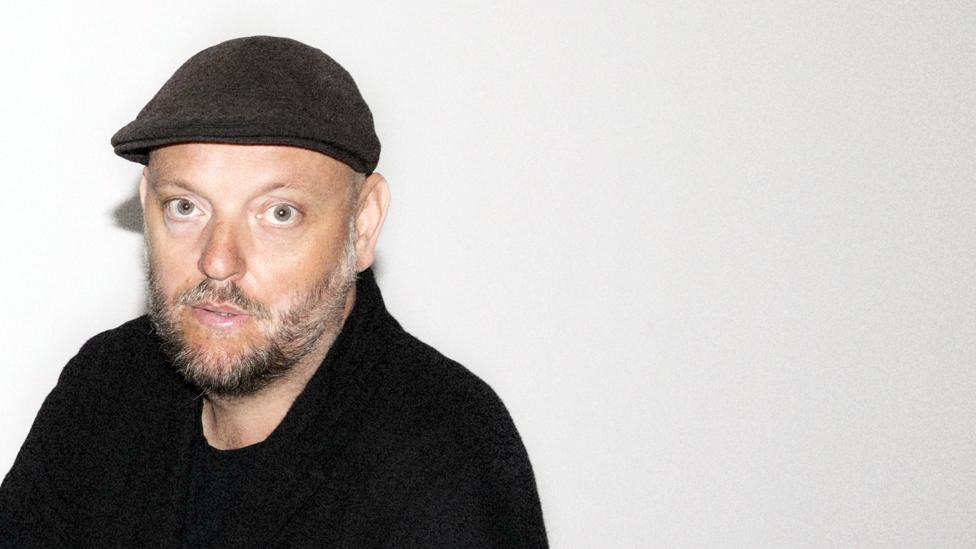
Alexander Stutterheim was inspired to set up his company after finding his grandfather's old waterproof fishing coat
While most consumer brands like to suggest they will make the buyer feel happier, Swedish rainwear firm Stutterheim warns that its coats may make the wearer feel a bit blue.
It is a somewhat novel approach to marketing yourself, but with fast-growing global sales, and celebrity fans including singers Kanye West and Jay Z, it seems to be working rather well.
"Melancholy is an essential part of being a human being, and you shouldn't fight it," says founder Alexander Stutterheim.
"And that is the analogy with the raincoat, you should go out and embrace the rain, enjoy it."
It is said that inspiration for a business idea can come from anywhere, and in Mr Stutterheim's case it was stumbling upon his melancholic grandfather's old fishing coat.
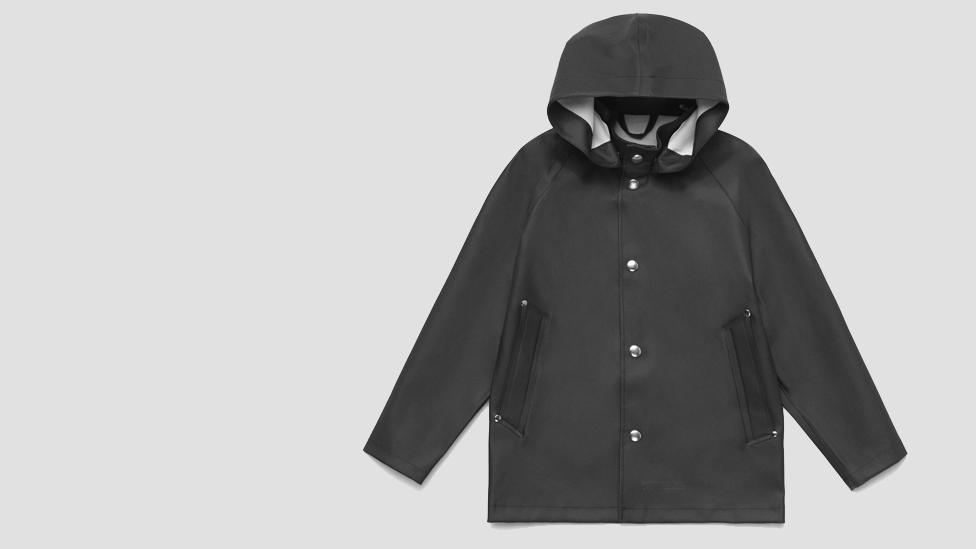
The coats have an old-fashioned look that differentiates them from many competitors
Hanging by a nail in an abandoned family barn on the coast near Stockholm, Sweden's capital, the 1960s jacket transported Alexander straight back to his childhood.
He remembered his grandfather wrapping himself up in the dark, sturdy rubber jacket, in order to head out fishing or sailing during the often bleak Nordic weather.
And Alexander fondly recalled a noticeable shift in his granddad's temperament when he returned.
"My grandfather was melancholic, but when he got back from 'chasing his demons' in his raincoat he was very creative," he says.
"He wrote poems and he read novels to us, and he wrote theatre plays."

Stutterheim sells direct to consumers around the world via its website
The rediscovery of the old coat happened in 2010 when Alexander, then 40, was working as a copywriter in the Swedish capital.
He says he had reached a point in his career when he was craving what he described as a "more boundless" outlet for his own imagination. And by coincidence he needed a new winter coat.
So he set about designing an updated version of his grandfather's jacket, both as a "homage and tribute" to his late relative's melancholia, but also as an alternative to the mountaineering jackets that had flooded the Swedish market.
"As a copywriter you are supported to be a bit eccentric, and a bit creative looking in your outfits, but I looked more like a golfer lost in town, or like I was going to climb a mountain," he says.
"I wanted to update my grandfather's coat to be cooler, and to feel good-looking when going out in the downpours. That was my mission.
"And also to build a theme or a story to embrace the rain."

The company owns just two of its own physical stores, one in Stockholm and one in New York
Alexander began by creating prototypes in his kitchen using plastic tablecloths, and then found a small factory in western Sweden to hand make his first batch of coats.
First selling to friends, within a year the brand had gained such a following that he was able to set up a small shop in Stockholm.
Fast forward to today, and the raincoats - sold with the strapline "Swedish melancholy at its driest" - are sold around the world via the firm's website, from retailers in 29 countries, and at Stutterheim's own physical stores in Stockholm and New York.
The company's annual turnover was 48.5m kronor ($6m; £4.3m) in 2016, and it is expected to post a 25% increase when 2017's results are published, led by the ecommerce side of the business.
"For me it is quite surreal," says Alexander, of the firm's rapid growth.
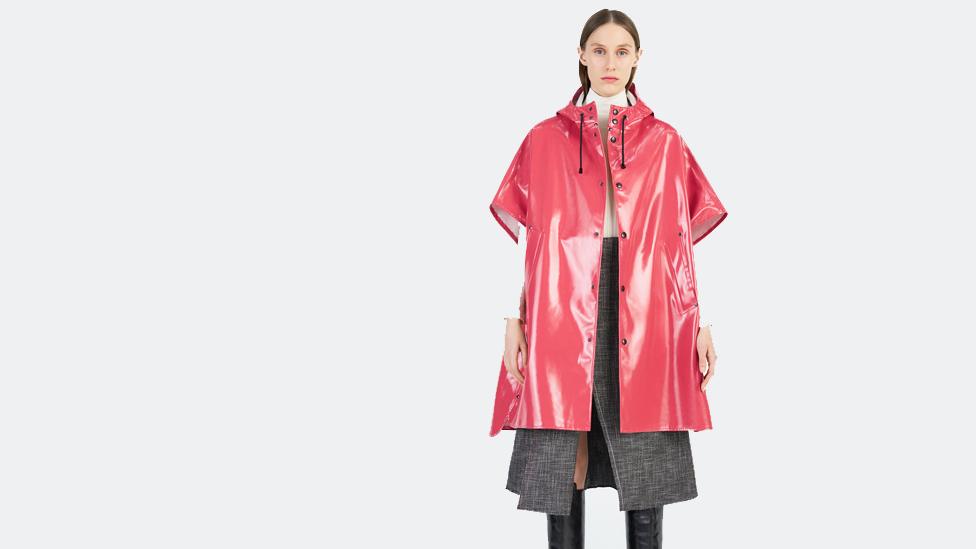
Stutterheim also has a range of more colourful jackets for women
While the company is now a success, he candidly admits that he initially struggled with the financial side of the business.
"I didn't know how to make a budget, or understand how to price things right," he says.
"It was a catastrophe for the first two years, financially. I had to sell my apartment, it was horrifying."
Things quickly improved in 2012 when Mikael Soderlindh, the cofounder of another fast-growing Swedish brand, Happy Socks, came on board.
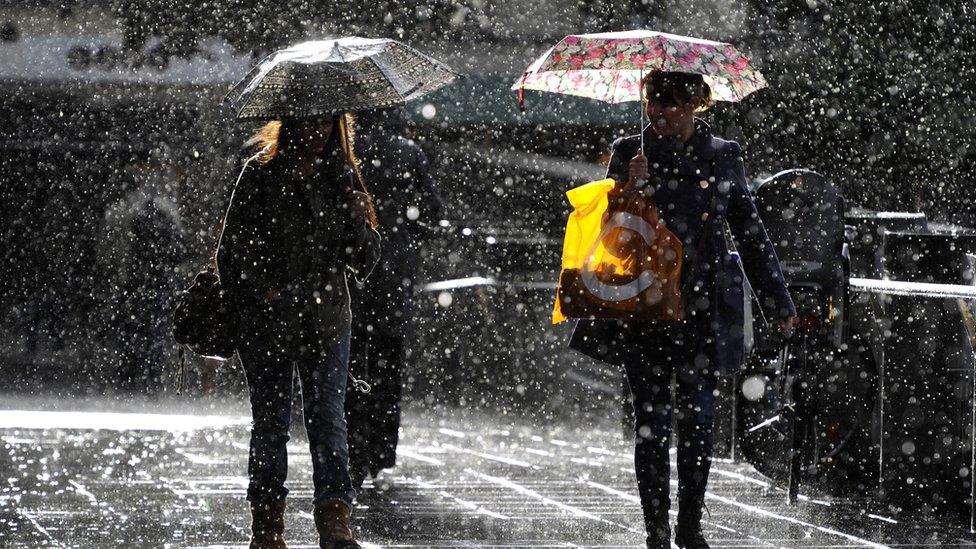
Swedish people are no strangers to rain and snow
Alexander says: "Mikael told me - you can stay here in your store and maybe get a salary eventually until you retire. Or we can hit the gas pedal, build a board, hire a CEO and make a business plan.
"I thought about it for one day, and then said - let's go!"
While Mr Soderlindh became chairman, John Laster, an experienced marketeer, became the firm's chief executive. Meanwhile, Alexander took up the position of creative director.
As part of Alexander's role he has focused on boosting overseas e-commerce sales by promoting the brand on Facebook and Instagram. In doing so, he highlighted its sense of melancholy.
"It is the opposite of companies who say, buy our stuff and a happy-go-lucky lifestyle will happen to you," he says.
Emma Lindblad, a lecturer in fashion studies at Stockholm University, says Alexander's own story has been crucial to getting shoppers to fork out for the label's coats, which at around 2,000 kronor ($247, £176) are pricey even by Scandinavian standards.
"When you have a more upscale brand it's a lot more important to have a good story, to have an almost mythical aspect," she says.
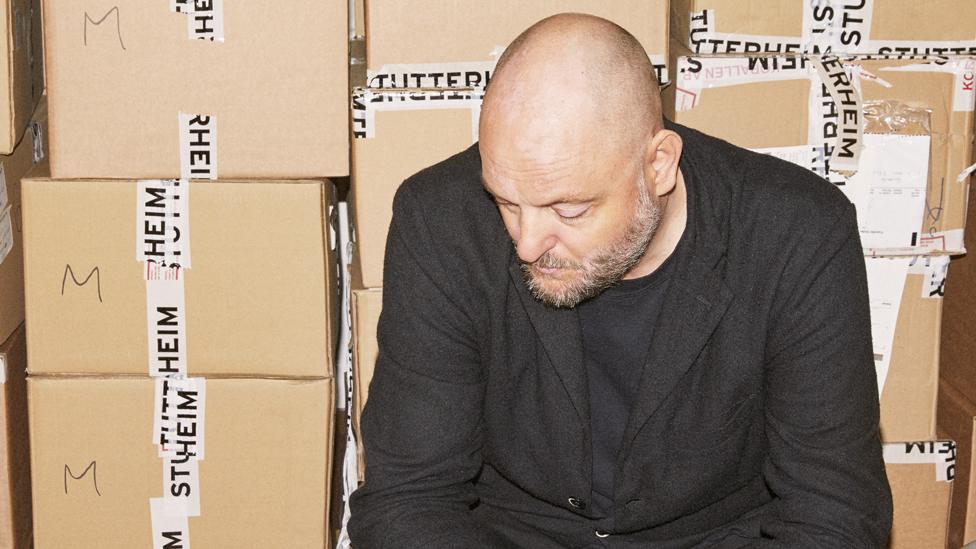
Alexander admits that he can suffer from melancholy
"You could get a raincoat for a third of the price somewhere like H&M, but Alexander has a real life narrative that gives a history and a heritage to the brand."
She adds that the key challenge for the brand is to keep its cult following at a time when young people are increasingly shunning brand loyalty.
Alexander is now just one of 10 owners of the business, and he admits that it was "tough" to step away from the boss role while still being the public face of the brand.
In the medium term he hopes that the firm will diversify into footwear and other products, but he admits that the pressures of the job can get to him.
He says his best coping strategy is to take comfort from a mantra installed into him by his beloved grandfather.
"He always said that in order to appreciate the taste of honey you sometimes need to drink vinegar."